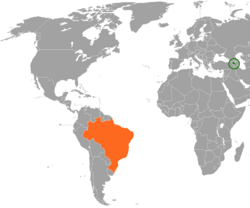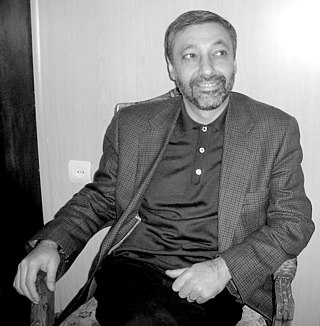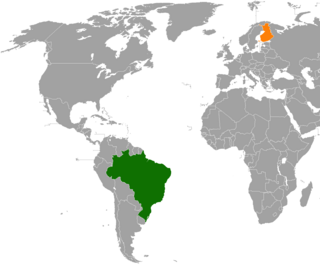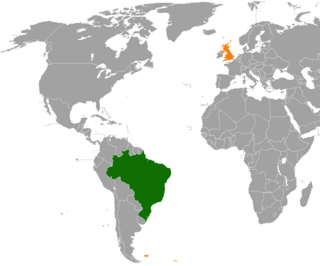 | |
Armenia | Brazil |
|---|---|
Relations between Armenia and Brazil, have existed for decades. The Armenian community in Brazil is the second largest in Latin America (after Argentina) totaling approximately 100,000 members. [1]
 | |
Armenia | Brazil |
|---|---|
Relations between Armenia and Brazil, have existed for decades. The Armenian community in Brazil is the second largest in Latin America (after Argentina) totaling approximately 100,000 members. [1]

The first Armenians arrived in Brazil in the late 1800s. [2] The biggest wave of migration to Brazil took place in the 1920s when several thousands Armenians came to Brazil (mainly from Lebanon and Syria) many having survived the Armenian genocide which was carried out by the Ottoman Empire. [1] Most Armenians settled in the São Paulo area. On 26 December 1991, Armenia restored its independence after the Dissolution of the Soviet Union.
In December 1991, Armenian Foreign Minister, Raffi Hovhannissian visited Brazil [3] to pave the way for establishing diplomatic relations between both nations. [4] On 17 February 1992, Armenia and Brazil officially established diplomatic relations. [5] In June 1992, Armenian President Levon Ter-Petrosyan paid an official visit to Brazil. [5] In 1998, Armenia opened a consulate-general in São Paulo. In 2006, Brazil opened an embassy in Yerevan. In 2011, Armenia opened an embassy in Brasília, after which the Armenian consulate-general in São Paulo was transformed into an honorary consulate. [1]
In 2015, the Brazilian Federal Senate recognized the Armenian genocide. [6]
High-level visits from Armenia to Brazil [5] [7]
High-level visits from Brazil to Armenia
Armenia and Brazil have signed a few bilateral agreements since the establishment of diplomatic relations between both nations in 1992, such as an Agreement on Cultural Cooperation (2002) and an Agreement for the establishment of visa free regime with respect to diplomatic and service passports holders (2002). [5]
In 1985, the city of São Paulo named a metro station after Armenia. In 2003, a square in downtown Yerevan, capital of Armenia, was named after Brazil.

Levon Hakobi Ter-Petrosyan, also known by his initials LTP, is an Armenian politician and historian who served as the first president of Armenia from 1991 until his resignation in 1998.

Alexander Arzumanyan is Armenia's first ambassador to the United States and to the United Nations. He served as minister of foreign affairs from 1996 until his resignation, with President Levon Ter-Petrosyan, in 1998. Since then, he has been involved in local politics, as chairman of the Armenian national liberation movement (2000–2002), and in the private sector, as chief advisor to the president of Armagrobank (1998–2000). At present, he works with local NGOs in the area of human rights, democracy, and regional cooperation, and is a founding member of the Turkish Armenian Reconciliation Commission, an independent group of prominent Armenians and Turks. The TARC was established in July 2001 to promote mutual understanding and good will between the people of Armenia and Turkey, and to encourage improved relations between the countries. In July 2002, the TARC commissioned a groundbreaking legal analysis regarding the applicability of the United Nations Convention on the Prevention and Punishment of the Crime of Genocide to the Armenian Genocide from the New York-based International Center for Transitional Justice.

Raffi K. Richardi Hovannisian is an Armenian politician, the first Foreign Minister of Armenia and the founding leader of the national liberal Heritage party. He is the founder of the Armenian Center for National and International Studies, the country's first independent research center.

Brazil–South Africa relations are the bilateral relations between the Federative Republic of Brazil and the Republic of South Africa. Both nations are members of the BRICS, Cairns Group, G20, Group of 24, Group of 77 and the United Nations.

The Armenian community in Argentina is the largest in Latin America totaling approximately 120,000 members.

Foreign relations exist between Armenia and Uruguay. Uruguay, as a small South American nations hosts a large Armenian community for its size. The Armenian community in Uruguay totals approximately 16,000 people.

Brazil–Finland relations are the diplomatic relations between the Federative Republic of Brazil and the Republic of Finland. Both nations are members of the United Nations.

Brazil–Hungary relations are the diplomatic relations between Brazil and Hungary. The importance of relations centres on the history of Hungarian immigration to Brazil. Approximately 100,000 Brazilians have Hungarian ancestry, making it the largest Hungarian community in Latin America. Both nations are members of the United Nations.

Brazil–Turkey relations are foreign relations between Brazil and Turkey.

Bilateral diplomatic relations exist between Armenia and Turkmenistan. Armenia has an embassy in Ashgabat. Turkmenistan has an embassy in Yerevan.

Current and historical relations exist between the Commonwealth of Australia and the Federative Republic of Brazil. Both nations are members of the Cairns Group, G20 and the United Nations. Australia and Brazil are the largest countries in the Southern Hemisphere.

Diplomatic relations exist between Armenia and Canada. Both nations are members of the Organisation internationale de la Francophonie and the United Nations.

Brazil–United Kingdom relations are the diplomatic relations between Brazil and the United Kingdom. Both nations are members of the G20, United Nations and the World Trade Organization.

Brazil–South Korea relations are the diplomatic relations between the Federative Republic of Brazil and the Republic of Korea. Both nations are members of the G20 and the United Nations.

Foreign relations exist between Armenia and China. The first references to Armenian-Chinese contact are found in the works of 5th-century historian Moses of Chorene and 6th-century geographer and mathematician Anania Shirakatsi. The People's Republic of China officially recognized Armenia on December 27, 1991. Diplomatic relations between Armenia and the People's Republic of China were established on April 6, 1992. The Embassy of China to Armenia was established in July 1992, while the Embassy of Armenia to China started its activities on August 10, 1996. The Armenian Ambassador to China resides in the Beijing embassy.

Brazil–Italy relations are the diplomatic relations between Brazil and Italy. Both nations enjoy friendly and semi-privileged relations, the importance of which centres on the history of Italian migration to Brazil. Approximately 31 million Brazilians claimed to have Italian ancestry making it the largest number of people with full or partial Italian ancestry outside Italy, with the Brazilian city of São Paulo being the most populous city with Italian ancestry in the entire world. Both nations are mutual members of the G20 major economies, United Nations and the World Trade Organization.

Diplomatic relations exist between Armenia and Mexico. Both nations are members of the United Nations.

Brazil–Czech Republic relations are the diplomatic relations between the Federative Republic of Brazil and the Czech Republic. Both nations enjoy friendly relations, the importance of which centers on the history of Czech migration to Brazil. Approximately 500 thousand Brazilians have Czech ancestry. Both nations are members of the United Nations.

Diplomatic relations exist between the Republic of Austria and the Federative Republic of Brazil. Both nations are members of the United Nations.

Brazil–Namibia relations are the diplomatic relations between the Federative Republic of Brazil and the Republic of Namibia. Both nations are members of the Group of 77 and the United Nations.